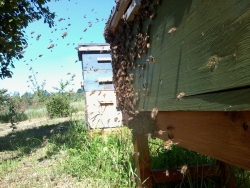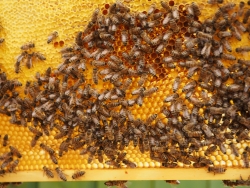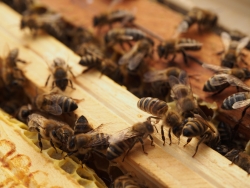THE FORT KNOX PROJECT - SUMMARY OF THE YEAR 2020
Difficulties and problems were always the case in the "Fort Knox" Project. This tradition, not necessarily awaited by us, was also continued in 2020. Spring left us with exceptionally high losses. Most of the time they are not low when bees are submitted to natural selection. But this year was comparable to 2017, in which we lost the vast majority of our bees. Now, again the losses reached nearly three quarters of all colonies in the pool. Such losses are extremely difficult to make up for. Especially as the remaining quarter of bee colonies are not always healthy enough and thriving to make three new colonies from each survivor.
At the beginning of 2020, there were 26 colonies in the project pool with 7 participants. By the spring, however, only seven colonies had survived – they were in the apiaries of three participants. Of these seven colonies, according to the data provided by the project participants, only 3 were in very good health, further 3 were weaker but with some potential, and the last one turned out to be a frame of bees with a surviving but non laying queen. So these were not resources that allowed for optimism.

However, the project has so far come out of such problems. So, in the full season, we set about trying to make up for the loss in the stock. This time, however, it was not without including a few splits from outside the actual project pool – so we have supplemented some part of the lost pool with nucleus colonies that were from our "private" resources. Several colonies were also boosted with an additional brood frame from those "private" resources. Despite trying to create as many colonies as possible, it was not possible to make up for all the losses - in the summer the deficit was still 3 bee colonies and such remained for the new year 2021. I would add at this point that all colonies made as part of the addition to the actual project's pool are reared in a manner fully consistent with the standards adopted within Project "Fort Knox".
We are not going to defend the thesis that both creating weaker colonies and supplying them with "foreign" worker bees is the best solution for the bees. These are actions that definitely qualify as practices of so-called "modern beekeeping", which in fact is largely responsible for the poor health of honey bee populations. With such tools, however, we can build up a larger number of colonies that will undergo natural selection in our dispersed apiary of „Fort Knox”. So we have to keep moving in a certain compromise.

The 2020 season was not the easiest one for all beekeepers (although it seems to have been like that mostly in southern Poland). It was so not only for those who submit their bees to natural selection. The weather turned out to be capricious and this probably had an impact on the occurrence of poor forage. A dry April was followed by a rather cold and rainy May and June. The summer was not hot either. In some manners, however, it was an unquestionably good year for nature. In many regions that had been dried out by the heat for years, the lack of moisture in the soil was at least partly refilled. In spite of this, the forage was poor. Perhaps because of the increased cool, or perhaps because of some other factor. For example, in 2020, lime trees bloomed beautifully, some of them were also buzzing with bees... That didn't help: during the lime tree foraging season, the bees' supplies of honey (if existing) only became smaller. Many beekeepers this year not only did not obtain much honey, but some even had to feed their bees all summer. Others obtained similar yields from whole apiaries as in normal years from a single hive. Probably that was the reason why the bees were not doing as well as they could have done with the rich and varied forage available.

In 2020, new participants joined the „Fort Knox” initiative and new bee colonies were introduced to the common pool. There are now ten participants with 33 bee colonies. This is still not much, but we are happy to see an increase in the number of participants. This time - because of the global Covid-19 pandemic we had to abandon the principle of meeting new members in person before joining the Project. A perfunctory online contact had to suffice for us.
Already now (end of January 2021) we know that also the next year will not be without problems. It seems that this is what beekeeping without treatment is like.... We know that at least 7 colonies have already died, which is about 23% of the pool, and together with the deficit of 3 colonies that we did not create last year, makes up about 30% of the project pool to be rebuilt in the upcoming season. And yet the real spring is still far away... However, as always, we remain positive.
In conclusion, we would like to remind the basic principles of management in the "Fort Knox" Project:
- we DO NOT treat bees with any chemicals and substances (we do not give not only synthetic pesticides, but also organic acids, mineral oils, or herbs) and we do not perform any technical treatments to control mite numbers;
- we limit the management to the minimum, as far as the assessment of the condition of bee colonies allows us;
- we do not extract any honey from the Project colonies that does not consist for the large surplus - so we try to leave natural food in the hives;
- we use only clean wax (foundation) with the so-called small cell (4.9 or 5.1 mm) or we keep bees foundationless.
Other Project rules can be found here (FAQ): https://bees-fortknox.pl/eng/zas_en.html#back
Bartłomiej Maleta / Bee Brotherhood
01/2021

